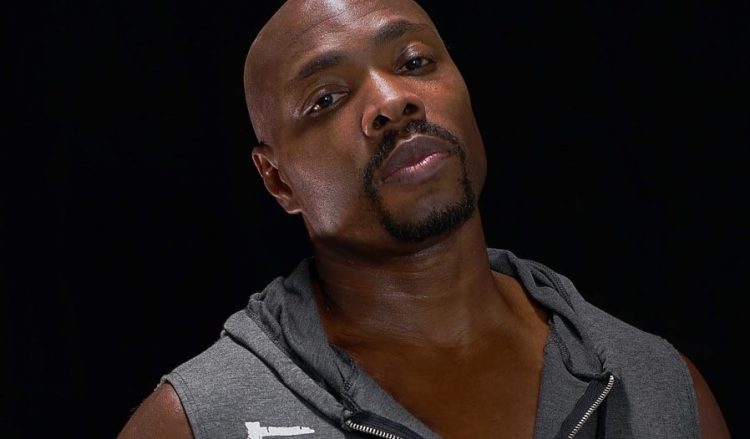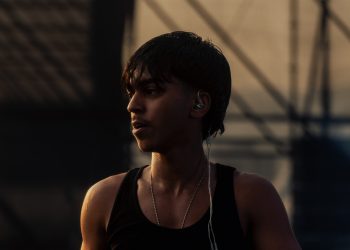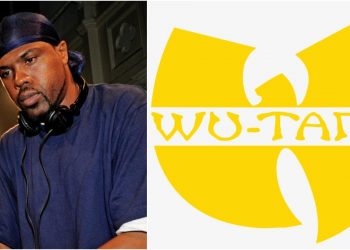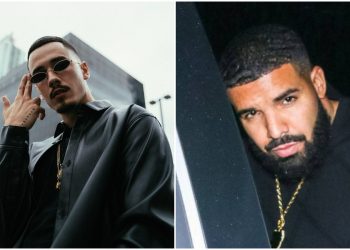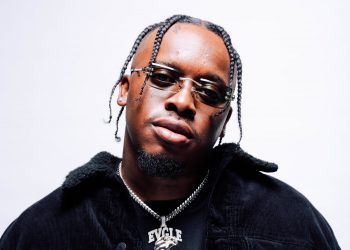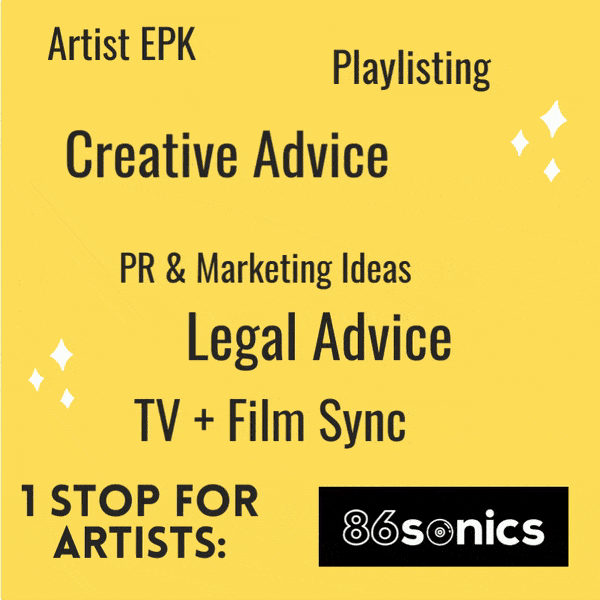Page Kennedy is from a time where music had a shelf life longer than a week. A period in time where the tearing of the plastic seal of a store-bought album incited a rush of goosebumps out of sheer excitement, opening the jewel case to see the inside artwork printed on the disc, the booklet on the left-hand side that would contain song lyrics and music credits, the careful removal of the CD from out of the casing. That magic has long been replaced by weekly updated streaming services and loosies leaked by hypebeasts holding hard drives containing hundreds of unreleased Lil Uzi and Playboi Carti tracks; enough to immortalize legacies through the internet itself.
Born in Los Angeles, raised in Detroit—two major rap cities—Page Kennedy has the DNA make-up of a master wordsmith, with a natural knack for entertainment. Page is well-known in the world of acting, with credits in numerous prominent works over the last decade. Those credits include appearances in Showtime’s Weeds, Blue Mountain State, 2003’s S.W.A.T, and 2018 Shark Megalodon Thriller, The Meg. While his acting career is successful, his hustle isn’t limited to movie scripts and film reels; he enjoys hitting the studio, sharpening the skills he’s honed as an emcee since he was a young kid.
Page is Page Kennedy’s latest project released in February with features from Xzibit, Elzhi, Method Man, and more. On the album, Kennedy’s poise is that of a rap veteran, confident and controlled with the ability to generate excitement within every bar spit. “Pain” is one of the moments of excellence on the tape. With the support of Elzhi and Method Man, all three rhyme-slingers take turns at the round table, ferociously working a chopped soul beat with an old-school cadence that could’ve been ripped out of the Golden Era of the ‘90s. Bars and wordplay may be the actor-rapper’s forte, but the real fuel that moves the project are songs like, “Fear” and “Queen”; written with complete awareness during a year filled with civil rights protests and the call for protection of Black excellence.
On the phone, Page is confident in his vision; a vision crafted from years of experience. He holds a deep appreciation for the roots of Hip-Hop; a love for the different cultures that helped raise the music to mainstream prominence, deep knowledge into the history that isn’t long forgotten, but in 2021, greatly undermined and under-appreciated. We discuss his new album, the messages behind some of the most powerful cuts, and the road that has led him to this point. Check it out below.
How long have you been rapping for?
Oh man [Laughs] How old are you?
27
Okay, so I’ve been rapping longer than you’ve been alive. I started rapping at 7 years old. And I got on my first stage at 10 years old. That’s 34 years ago.
What was the stage for, like a local talent show?
I was a special guest at the State Fair. In Detroit, They used to have a thing in the summertime called the state fair. And they would have performances there. And I was the special guest. I got hooked up by a promoter in Detroit. He is the person who hooked me up with Ice Cube and Ice T, and all these big rappers that I loved when I was so young, because he used to have dealings with them and promotion etc. So yeah, he put me on my first stage when I was 10 years old. And he also put me on my first rap video when I was a young teenager.
What made you initially want to start rapping?
Ah, well, my brother, ironically Anthony. He was into it. And he was 10 years older than me. So obviously anything that he’s doing or into I’m nosy and I’m right there trying to see what it is. So he was listening to this rap music and I started listening to it because he loved it. And you know, I think Kurtis Blow was probably like one of the first people that I really paid attention to along with the cats that came right before him. But Kurtis Blow was like the main one. I was on him to Run DMC. I just started mimicking everybody else in town until I started making my own raps.
What music would be around the house often while you were growing up?
Oh, well, my dad would often play you know, the oldies but goodies. So Marvin Gaye, Teddy Pendergraph, Luther Vandross. My dad would be playing that stuff and then my brother would be playing Fat Boys and I love me some Fat Boys. You know, like my favorite movie growing up. It was Krushed Groove. I probably watched that movie like 100 times.. But it was telling the story at Def Jam of Russell Simmons and Run DMC and LL Cool J and Fat Boys.
So you grew up in LA, but you were born in Detroit. You eventually ended up back in Detroit? So how have you experienced living in two major cities that played a role in developing your sound?
You know, that’s a very interesting question. Because my formative years were in Detroit, obviously, like the the years that make you who you are, you know, your adolescent years, was in Detroit. And so a lot of my sound came from there, but always had a huge affinity, almost fanatical to West Coast Culture, sound, content and music. And so, you know, while everybody was up on like New York rap; In the late 80s, early 90s, I was on West Coast rap like that, the lore of the Jheri curl and like gangsters, the gangs, the cars, and just the preponderance of people that came together like that, that was lore for me. So I think a lot of my raps reflected that.
What was it about West Coast rap that was so that was so different from East Coast rap back in like, early 90s?
Well, I know in the 90s for me, it was the culture. Like, I just love the culture of the West Coast, now not love it like I wish I was in it. I definitely don’t wish I was in it. Like, I posed that question on Twitter yesterday, ‘cause I was watching Hip-Hop Uncovered. And I’m watching the movers, shakers, producers and the top people that came from the streets that made it big in the music business from Detroit, to New York, to Cali. And the Cali stories are the most interesting to me when I’m watching it on TV, and I’m looking at the way that it looks. And I asked this question: What was more dangerous in the late 80s, early 90s: the streets in New York or the streets in Los Angeles? Because to me, it seemed like in New York, It was a lot of stick up people right? You get robbed, you know, but it seemed to be like less gunplay, far as a lot of people like getting killed and murdered in comparison to Los Angeles, where there were so many gangs. And with gangs, there were just so many more people, all of these different types of crazy guns that was happening. And then also in LA, if you get 12 months of hot weather. In New York, the majority of the time, it’s cold there. So there’s been an amalgamation of people just out on the streets the whole year round. So it just seems scarier in Los Angeles, and that’s exciting to watch when we are young like, see it to visualize it, you know?
You’ve gotten to work with Method Man for the new project. So tell me how that collaboration with him came about.
I’ve known Method Man for 25 years, first opening for him in Grand Rapids, Michigan when I was in college, and then I’ve been cool with him for many years, since we share the small screen together, we’ve been on different stages in different countries. And this was just the first time we actually got on a song together. It was beautiful. I hit him up. And he got right back to me, then I got to have him on a song with one of my best friends and one of the best lyricists in the world, Elzhi. And it’s made for a super dope song. “Pain” is like, one of people’s favorites on the album.
View this post on Instagram
Being a prominent actor as you are, to go ahead into a rap career, what was it like to have resources like Method Man available that you can reach out to?
Although, I’ve been around for a long time, man, you know, I just posted a picture with me and Biggie today because he died today. So it is the anniversary of his death, and always trying to commemorate him on this day, and so, I’ve been around big time rappers since I was a kid. I’ve forged these relationships, and I’ve kept them, so it’s cool to be able to go on your phone and just hit up a legend. And there’s even more dope when they respond [Laughs].
You’ve been really passionate for rap since you were a kid, how’d you get into acting?
Well, I always wanted to be an entertainer since I was six years old And I found Michael Jackson. Michael Jackson, is the reason that I wanted to be an entertainer in the first place. like he is, my everything, like everything that I am is because of Michael Jackson. I love him more than anyone they show. The active stuff is just something that I always wanted to do since I saw The Wiz. When I saw Michael Jackson play the Scarecrow in the Wiz. I said, This is what I want to do in my life. So living in Detroit, I didn’t have much opportunity to hone those skills as an actor until I got to high school. I played football and baseball primarily and I was a rapper, one of the best rappers in my school. But then also, I was in the drama club and then when I went to college, that’s what I majored in was acting, because I wanted to be great. I didn’t just want to be good. I wanted to be the best actor slash rapper in the world.
So as an actor, you’re prone to playing a role and following the script. How do you tackle something as unpredictable as rapping differently than how you take on shooting?
All movies are all the same. It’s all the same. I go at it all the same, I try to be unique. I try to be interesting. I try to be engaging. And, you know, because it’s all entertainment. So the best is going to be who entertains the most? Who has the most entertaining verse, who has the most entertaining character and delivery of lines? You know, so I packed them both the same way.
A lot of rap legends have a hard time bearing in an industry that’s moving so fast, because right now, rap as a genre itself has been pretty much the most popular. It’s arguably more popular than pop music. So what do you believe is the key for survival in the modern era streaming and disposable music?
Consistency and there’s a time period. You know, people, as soon as your album drops, as soon as your movie drops, as soon as your TV show on a streaming service drops, you get like, a couple weeks tops. And then Alright, it’s pacing. Now what? I go through everything, you know, I’m big on social media as well. And if you stop, then people just forget about you; so consistency is key for all of that. Putting out content to stay relevant otherwise, it becomes very irreverent out there for you, if you don’t.
But times change and we’re in a microwave era. So now, you know, you have to turn these things over quite frequently. A rapper should at least drop a project a year.
Because I’ve often seen a debate between whether or not artists should drop within a four year cycle like Kendrick Lamar, Or should they drop within more frequent increments, like how someone such as Wayne used to drop?
Well, I think it used to be a case where you could take four years to make an album, and that way they anticipate it. People are clamoring and looking forward to it. But times change and we’re in a microwave era. So now, you know, you have to turn these things over quite frequently. A rapper should at least drop a project a year. We’re thinking about a project a year that may seem like a lot for other artists too.
But because of the way things are going, it’s like music doesn’t have much of a shelf life anymore. Next week, we’re on our next project. Well back then we would rip the seal off a CD and then spin the CD until the next project that comes out.
Yeah, it would last you for years. You know, one project will last you for years. But now there’s so many artists that you just forget about. You got kids out here who are putting out multiple projects a year.
Going into recording Page, what was one of the goals you were hoping to achieve with this project?
To bring awareness to the black fight, to celebrate black women and to be seen. Be seen or respected and loved as a people. Those were my goals. And I feel like I accomplished that. I brought it in a way that you could see that it was visceral, that could be touchy. Which is why I did those videos. And then you have songs like “Shine”, which sparked hope and promise for everyone dealing with the time that we are going through now, and to know that you can have inspiration to push ahead. Then songs like “Queen”, I wanted to commemorate black women, and celebrate them. And then you have “Flowers”, where I want to give perspective on how we should be able to celebrate each other and be okay with it. You know, and we should be able to do that while we’re still alive and around to receive it.
On the album, You talked about being treated as a second class citizen following prison, which is a huge issue in marginalized communities. How can we support the fight against mass incarceration? Once you go through the prison system, you come out of it, you’re automatically considered a second rate citizen, no matter how you want to put it, you can’t get jobs the same, nor can you vote. How can artists push back against this injustice?
Well, I don’t have the answer to that. And the only thing I can say that I would imagine that will be helpful is that we continue to speak on these things and to bring them to light and to try to have conversations about them and get everyone involved in these conversations. Because that’s the only way everything is going to change is if the people that make the laws you know are a part of these conversations. The people that break the laws are part of these conversations and that way we have a fuller understanding you know what’s expected you know on both parts I agree honestly.
View this post on Instagram
On the tape you take a jab at Lil Pump. I mean we all have at this point. Which emerging artists are you interested in working with?
My bucket list is Eminem and that will be the pinnacle of my career. He is at the apogee of rappers that I want to work with.
You got the careers of Drake and Donald Glover who are two artists who started off as actors and who are now prominent musicians has their careers inspired you in any way?
I think them being auspicious has inspired me. I think it’s very difficult to do this on the level that they do it on. And that is definitely aspiring because I want to reach their level. But people, creative wise that inspire me would be Common, would be Andre 3000, 2Pac, T.I. Those people creatively, you know, inspire me as far as the rapper-actors.
in terms of your rap career, do you see yourself investing full time into it? That can include also starting up an indie rap label, as in owning your own record label?
Well, I have a creative A.D.D, so I need to do a bunch of different things like this. This is my makeup, this is how I am. So Nah, I think, you know, I think when I’m not doing my acting stuff, I have time to jump into either Straight Bars mixtape, which is what’s coming next, or an album. Or now I’m about to start writing a book, you know, I just need to be fulfilled in all different ways that I’m talented in. And when I’m in my music, I’m really giving it 100 percent. But then I need to move on to something else.
What impacted the most towards the creation of the album because I know you’ve touched on it earlier. But what really got the album going?
I was inspired by new upcoming artists, Nate Grant and Shane Moore. And because I wasn’t in a place where I wanted to, like write, like, I just was and then their projects really inspired me in a lyrical and creative way. And so I made “Fear” because I felt like it was necessary. And then I made “Safe” because I needed a follow up to “Fear”. And once I made those two I was like, you know, people are listening to me, I’m impacting people. I’m you know, making an imprint. I should keep going. And so that’s when I created “Shine”. It was three songs in and I was like “I guess I’m doing an album.” And as crazy I think it was, it worked out like that.
Which producers did you work with for the project?
I only work with two producers, my main producer Mike West, who produces the majority of my tracks. And then the song with Xzibit, I went to the Aftermath producer Focus.. to create the song.
I don’t create music for right now, for a wave. I create music that 20 years from now, you’ll be able to listen to, and it’s still amazing.
So with plenty of 2021 still in the horizon, and let’s hope we survive it at this rate. What goals do you have as an artist?
To continue to make music and to try and just become more impactful, to get more eyeballs on what I’m doing and more ears and listeners to tap in and to go to my back catalogue and catch up. That’s, that’s my goal. My goal is to create music that is here for eternity. I don’t create music for right now, for a wave. I create music that 20 years from now, you’ll be able to listen to, and it’s still amazing. I listened to 2Pac’s last album all night last night, Makaveli. It’s still dope to me. And look how many years later because amazing, great content is ubiquitous. And so that’s what I want to be able to do. I want to be able to continue to make music that lasts forever. I have people continue to find it. it’s important that the music is made to last a long time.”
What do you want the world to know about Page Kennedy today?
I just want to show by an example, that it’s easier to be a good person, that it is easy to love. And everyone’s happier when you lead with love more than hate. And that’s all I want to say.



